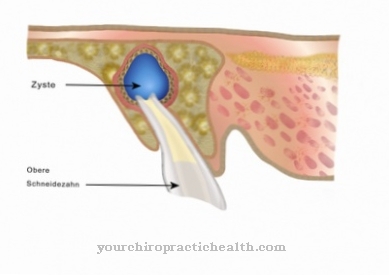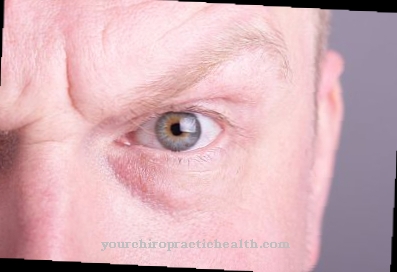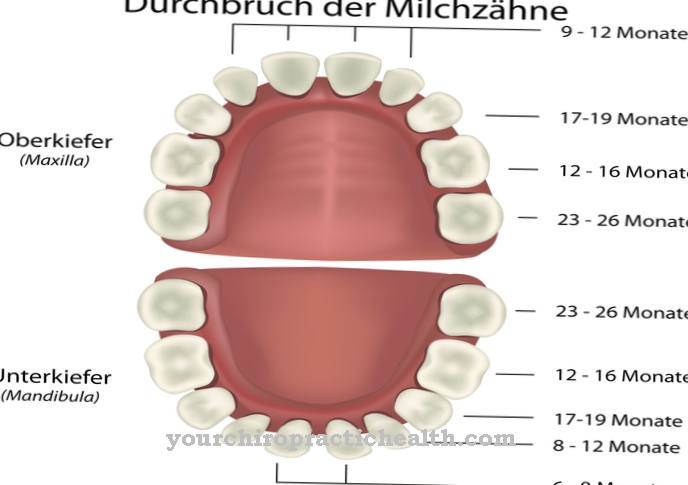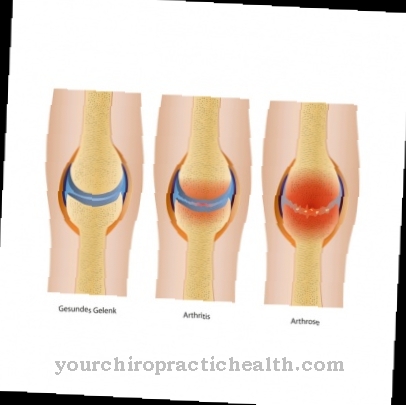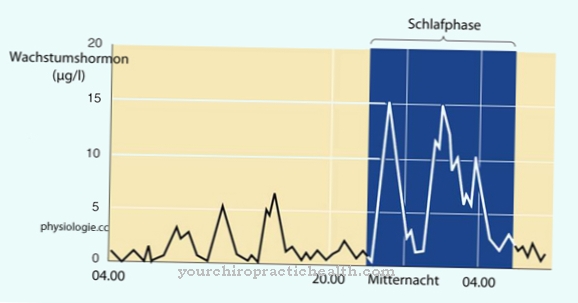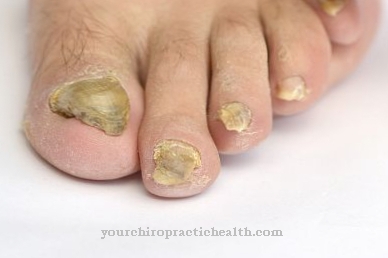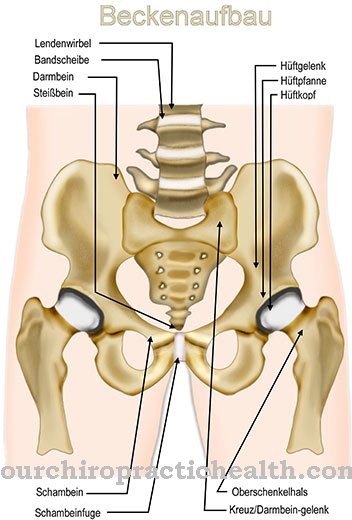Bad breath is an unpleasant smell of the breath and is the result of poor hygiene or inflammation in the mouth and throat. Bad breath is not a disease, but mostly a symptom, which does not necessarily have to occur as a result of an illness.
What is bad breath?

Bad breath is a symptom, not a disease in its own right, that can appear either due to poor hygiene or due to inflammation or disease. Bad breath is mostly a taboo subject that the afflicted patient is reluctant to talk about. Out of embarrassment or embarrassment, other people also rarely speak to those affected, who rarely notice their own bad breath themselves.
Bad breath is a symptom that is relatively common. Almost 25% of people in Germany consciously or unconsciously suffer from bad breath.
causes
As already noted, the annoying bad breath is mostly caused by poor hygiene of the mouth and throat area as well as the teeth and gums. However, bad breath can also occur as a result of inflammation in the inside of the mouth or due to other diseases. The halitosis itself mostly arises from putrefaction processes caused by bacteria. The sulfur-containing metabolic products in particular lead to the well-known unpleasant odor.
Short-term bad breath also occurs after consuming certain foods or beverages. Known are garlic (garlic has a lot of sulfur, which is excreted through the mouth and skin and can lead to unpleasant smells), onions and alcohol. An empty or empty stomach, too much coffee and smoking can also lead to unpleasant bad breath.
Organically caused bad breath often arises after belching, bloating and heartburn. Diseases of the digestive system and metabolism also often lead to unpleasant bad breath.
Bad breath is just as common in diseases of the teeth and gums. These are mostly caused by inadequate care, so that bacterial putrefaction occurs, especially in the spaces between the teeth and gum pockets, which then cause disgusting smells. This also includes leftover food and dental plaque. Furthermore, the tongue itself can also be attacked by putrefactive bacteria.
Unpleasant halitosis can be traced back to a wide variety of causes. In order to enable its elimination, it is necessary to first determine the cause in question, and this usually requires medical or dental advice. In no way should one be satisfied with indiscriminately using one of the mouthwashes advertised in the advertising.
In very many cases bad breath is caused by damaged, neglected teeth. Destroyed and putrefactive teeth, root remains, mostly loosened and infected with purulent inflammation and with fistulas, badly fitting crowns, bridges and inlays on which food residues can adhere play a role here.
If the teeth are not even cleaned thoroughly with toothpaste and toothbrush, the bad breath will not come as a surprise. Where dental and oral care are so grossly neglected, tartar and dental plaque will also form to an unusually high degree. Under certain circumstances, this alone can be enough to adversely affect the breathing air.
If oral hygiene is neglected in this way, chronic gum disease often results. The progressive tissue disintegration of the loosened and bleeding gums creates protein waste products which, in conjunction with the decomposition of the leaked blood, result in a bad taste and smell. In an unclean oral cavity characterized by destroyed teeth and sticking of food residues, abnormal fermentation and putrefaction appear.
Another cause of bad breath can be diseased tonsils (tonsils and tonsils), which often contain pus and decay products of dead mucous membrane tissue in deep fissures. The problem can also have its cause in diseases of the trachea and esophagus, stomach and intestinal system, in metabolic diseases and in those of the urinary system.
A pronounced typical and unpleasant halitosis is usually found in anemia (chlorosis), which persists even with the most embarrassing oral care. The same applies to people suffering from diabetes or diabetes, where a certain, albeit not unpleasant, smell in the air that is reminiscent of fermenting fruits can hardly be removed.
To supplement the causes listed, a few more should be mentioned: inflammation of the nasal mucosa, narrowing of the esophagus, stomach cancer and colon cancer, etc.
Rarer causes of bad breath are tumors in the throat, mouth and nose. A low flow of saliva also promotes mouth odor. Medication, fasting and snoring are also causes of the unpleasant smell from the mouth. A runny nose, sinus infection, tonsillitis and sore throat can also cause temporary bad breath.
You can find your medication here
➔ Medication for bad breath and bad breathDiseases with this symptom
- Tonsillar angina
- Periodontal disease
- Mouth rot
- diphtheria
- Inflammation of the gums
- Tonsillitis
- Cirrhosis of the liver
- Hyperacidity
- Reflux disease
course
Bad breath can become an enormous burden for those affected or for other people. Short-term bad breath, caused by poor oral hygiene or the consumption of certain foods such as garlic or onions, etc., is differentiated from permanent bad breath. Bad breath is defined as a bad taste or unpleasant smelling air, caused by bacteria that are on the tongue.
Bad breath is divided into two forms in the course. Foetor ex ore is used when the bad breath is due to a disease in the mouth, throat or nose and occurs when breathing out of the mouth. If the unpleasant smell arises when you exhale from your nose with your mouth closed, it is called halitosis.
Complications
The complications of bad breath are mainly related to social issues. Bad breath leads to very unpleasant situations when dealing with other people. This topic is often avoided out of shame or because of social etiquette. At the same time, people close to you try to turn away carefully in conversations and to build a physical distance.
The behavior leads to misunderstandings and is usually misinterpreted. The search for a physical distance is considered a sign of a lack of sympathy. In bad cases, bad breath can cause another person to gag. This happens when the halitosis smells like acetone or nail polish remover.
The pungent smell suggests undetected diabetes, but is rarely communicated openly in social interaction. Bad breath is an indication of an imbalance in the oral flora or it indicates organic problems. The lack of knowledge about bad breath prevents a timely visit to a doctor. This reduces the possibility of early detection of diseases.
Treating the cause of the bad breath results in a temporary intensification of the odor in some cases. In order for the bad breath to be eliminated, the underlying disease must be completely healed beforehand. Often it is only after the end of therapy that it becomes apparent whether the bad breath persists and thus has another or another cause.
When should you go to the doctor?
If the bad breath becomes noticeable, going to the dentist is the most sensible step. Finally, the smell could indicate a tooth or gum disease. In many cases, professional teeth cleaning already helps. Odor particles that cannot be removed with home oral hygiene are removed here. Clarification from the dentist on how to properly clean teeth at home can also help the patient. If it should happen that the dentist cannot diagnose anything, the next visit to the family doctor is inevitable. He asks about the symptoms.
Finally, an organic cause cannot be ruled out either. The primary goal of the family doctor is also the oral cavity. It is examined whether any fungal infections are present. For this, a smear is taken from the oral mucosa. A laboratory test can then find out whether there is an infection. If nothing is found in this context, the doctor examines the remaining organs of the body. Above all, a detailed examination of the liver can provide information about a possible cause of the bad breath. But the lungs are also monitored to rule out any fluid build-up and the throat and abdomen are palpated.
Doctors & therapists in your area
Treatment & Therapy
As a rule, bad breath can be combated or treated well. Talk to your doctor even if you are embarrassed about the subject. Bad breath is a symptom and should be treated as such. Better oral and dental hygiene is usually sufficient.
If the teeth themselves are rotten or affected by gum disease, the dentist can provide a remedy, even if this treatment is usually not cheap. It should still be carried out, otherwise serious diseases can occur due to the putrefaction in the mouth.
Otherwise, the bad breath must always be treated or combated according to its cause. Your family doctor, dentist or ear, nose and throat doctor can provide you with further information, as the possibilities and causes of bad breath can be so diverse. If illnesses are the cause, these must first be treated.
If diseased teeth or diseases of the oral cavity are the cause, it is usually very soon possible to eliminate the bad taste and odor through proper oral and dental hygiene by removing any damage. Apart from the treatment of the underlying condition by the doctor, gargling with a two percent alcoholic vanillin solution using 20 drops on a glass of water is sufficient in most cases for local and symptomatic treatment.
Outlook & forecast
In most cases, bad breath can be treated relatively well and quickly. It occurs in many people and can be a relatively heavy burden on everyday life.
Treatment by the doctor is not always necessary. Bad breath is often related to poor oral hygiene and can be limited by brushing your teeth more often and using a mouthwash.
Bad breath can also come from the stomach itself and cannot simply be treated in the mouth. This unpleasant odor can occur either from food that has a relatively strong smell or from illnesses such as heartburn or other stomach problems. If the bad breath occurs permanently and cannot be removed even with improved oral hygiene, a doctor should be consulted. There are many medications that can be used to treat bad breath, most of which can be purchased from a pharmacy without a prescription.
Since in most cases a specific treatment by the doctor is not possible, the success in eliminating the bad breath depends heavily on the patient's will. Most of the time, however, the bad breath can be removed with simple means, so that normal everyday life can be taken up.
You can find your medication here
➔ Medication for bad breath and bad breathprevention
other home remedies ↵ for bad breath The be-all and end-all of preventing Bad breath is regular and careful oral hygiene or oral care. Furthermore, the dentist should be visited regularly in order to treat any rot or inflammation at an early stage. Avoid smoking, alcohol, too much coffee, and foods known for their smells (e.g. garlic). Drink enough to keep your saliva flowing. Home remedies, such as chewing parsley and ginger, are said to be preventative.
Chewing gum, mouth sprays, and fruit can provide short-term relief, but do not tackle the cause.
Home remedies & herbs for bad breath
- The garlic bad breath is neutralized by chewing aniseed grains.
You can do that yourself
Bad breath can usually be treated relatively well by home means. In many cases, bad breath results from poor oral hygiene. Here it helps to brush your teeth regularly and also to use a mouthwash. A tongue brush or tongue cleaner can help remove unpleasant smelling plaque on the tongue and thus eliminate another possible cause of bad breath. It is also advisable to perform these operations after each meal. Chewing gum also prevents bad breath and can eliminate it. In the pharmacy there are various remedies that have a relatively strong smell of mint or menthol and can thus also reduce bad breath.
Those who want to avoid bad breath should not eat spicy foods or foods with a lot of onions or a lot of garlic. Often these foods are deposited in the stomach and it takes a few hours for the stomach to digest them. During this time, the bad breath rises from the stomach. To cover up this bad breath, something else should be eaten or drunk after consuming these smelling foods. Fruit and vegetables are particularly suitable here to cover up bad breath.
Bad breath can also be caused by bad teeth and problems with the gums. Therefore, if the patient has a toothache or bleeding gums, a dentist should be consulted to correct these problems.




